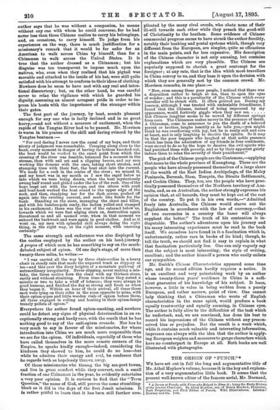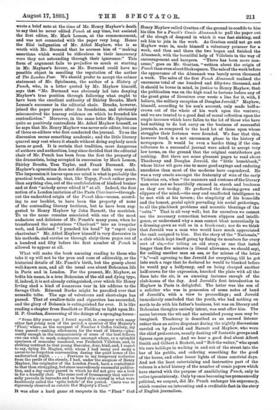THE ORIGIN OF "PUNCH."*
WE have set out in full the long and argumentative title of Mr. Athol Mayhew's volume, because it is the key and explana- tion of a very argumentative little book. It seems that the present well-known editor of the famous serial, Mr. Burnand, • A Jorum of Punch, with Those who Helped to Brew it: being the Early History of the London Charirari. By Athol Mayhew, son of Henry Mayhew, Projector, Part Proprietor, and Fir,t Editor of Punch. With Illustrations. London : Downey and Co. 1695.
wrote a brief note at the time of Mr. Henry Ilayhew's death to say that he never edited Punch at any time, but assisted the first editor, Mr. Mark Lemon, at the commencement, and was not connected with the paper very long. Hence the filial indignation of Mr. Athol Mayhew, who is so wroth with Mr. Burnand that he accuses him of " making assertions which would be ridiculous in their inaccuracy were they not astounding through their ignorance." This form of argument fails to prejudice us much at starting in Mr. Mayhew's favour, as Mr. Burnand could have no possible object in assailing the reputation of the author of The London Poor. We should prefer to accept the calmer statement of Mr. Spielmann, the author of a History of Punch, who, in a letter quoted by Mr. Mayhew himself, says that "Mr. Burnand was obviously led into denying Mayhew's true position through following what ought to have been the excellent authority of Shirley Brooks, Mark Lemon's successor in the editorial chair. Brooks, however, joined the paper years after its foundation, and obviously misconceived the hearsay evidence on which he founded his contradiction." Moreover, in the same letter Mr. Spielmann quite as positively contradicts Mr. Athol Mayhew himself, as he says that Mr. Henry Mayhew was never sole editor, but one of three co-editors who first conducted the journal. To us the discussion seems something academic ; and the little literary quarrel may rest where it stands without doing anybody much harm or good. It is certain that tradition, most dangerous of authors and authorities, long since decided that the editorial chair of Mr. Punch has been from the first the property of the dramatists, being occupied in succession by Mark Lemon, Shirley Brooks, Tom Taylor, and Frank Burnand. Mr.
Mayhew's opusculum does not disturb our faith very much. The impression it leaves upon our mind is what is probably the
practical truth, namely, that, like Topsy, Punch rather grew, than anything else, out of the confabulation of kindred brains, and at first "nobody never edited it" at all. Indeed, the first notion of a London imitation of the Paris Charivari—tbrough- out the undoubted origin of the Punch idea—seems, accord-
ing to our booklet, to have been the property of none of the contending literary brethren, but to have been sug-
gested to Henry Mayhew by John Barnett, the musician. To us the name remains associated with one of the most audacious and delicious of Mr. Punch's many puns, when he transformed the mysterious " Charivari " into an irregular verb, and Latinised "I punched his head" by " caput ejas
charivabar." Mr. Athol Mayhew himself is very discursive in his methods, and carries us through sixty-three pages out of a hundred and fifty before the first number of Punch is allowed to appear at all.
What will make the book amusing reading to those who take it up will not be the pros and cons of editorship, or the historical details of Mr. Punch's birth, but the gossip about well-known men, and all the usual ana about Bohemian life in Paris and in London. For the present, Mr. Mayhew, as befits his name, is a true Bohemian of the old and dying type, if, indeed, it is not already extinguished, over which Sir Henry Irving shed a kind of humorous tear in his address to the Savage Club. Edmund Burke might be parodied over that nomadic tribe. The age of velveteens and short-clays has
passed. That of swallow-tails and cigarettes has succeeded, and the glory of Bohemia is extinguished for ever. It is like reading a chapter from Smollett or Fielding to light upon Mr. H. P. Grattan, discoursing of the doings of a sponging-house : "Some fifty years ago I found myself, in company with many other fast young men of the period, a member of Her Majesty's where, as the occupant of Number 4 Coffee Gallery, my time passed—making allowances for the want of liberty—plea- santly enough in the companionship of some of the best fellows one can wish to meet, conspicuous amongst whom, as a splendid specimen of muscular manhood, was Frederick Villebois, and, in striking contrast to that young Hercules, dear, kind, and, I regret to say, dying Dr. Magian, with whom I had many and many a never-to-be.forgotten conversation during the quiet hours of the
undisturbed night Previous to my temporary seclusion from the perils of the streets, I had, under the auspices of Henry Mayhew, the originator of the London Punch, been a contributor to that then struggling, but since marvellously successful publica- tion, and a day rarely passed in which he did not give me a look in for a friendly chat. The same sort of freemasonry that univer- sally prevails in barracks and on board ship existed in what were facetiously called the spike hotels' of the period. Caste was as rigorously observed as outside Her Majesty's Fleet."
It was after a hard game at racquets in the " Fleet " that Henry Mayhew called Grattan off the ground to confide to him his idea for a Punch's Comic Almanack to pull the paper out of the slough of despond in which it was fast sinking, and ask him to join in the work. As Grattan could not go out Mayhew went in, made himself a voluntary prisoner for a. week, and then and there the two began and finished the Almanack, with the bountiful help of Villebois in the way of encouragement and hampers. "There has been more non- sense," goes on Mr. Grattan, "written about the origin of Punch than even about Shakespeare. The sale of the work before the appearance of the Almanack was barely seven thousand a week. The sales of the first Punch Almanack realised the enormous total of one hundred and fifty-two thousand, and it should be borne in mind, in justice to Henry Mayhew, that the publication was on the high road to fortune before any of the great guns of literature ever wrote a line for it, with, I believe, the solitary exception of Douglas Jerrold." Mayhew, himself, according to his son's account, only made half-a- crown out of the whole of his work upon the venture ; and we are treated to a good deal of moral reflection upon the ample incomes which have fallen to the lot of those who have had nothing to do but carry on the business of successful journals, as compared to the hard lot of those upon whose struggles their fortunes were founded. We fear that this, however hard, is a not uncommon phase in the history of newspapers. It world be even a harder thing if the con- tributors to a successful journal were asked to accept very low terms, on the ground that the original contributors got nothing. But there are some pleasant pages to read about Thackeray and Douglas Jerrold, the " little hunchback," whose bitter wit gave rise to more good sayings and enduring anecdotes than most of the moderns have engendered. He was a very oracle amongst the fraternity of wits of the early Victorian era, when " the manners and customs of the literary man were not so beautifully encased in starch and buckram as they are to-day. He preferred the dressing-gown and slippers of the mind,—the easy and unaffected intelligence to be met with at his tavern ; the simplicity of his home-life and the honest, genial spirit pervading his social gatherings, to all the pinchbeck problems and neurotic bleatings of the cults." That is all very well ; but for ourselves we cannot see the necessary connection between slippers and intelli- gence, or understand why a man cannot bleat neurotically in a dressing-gown as well as in a frock-coat; nor do we think that Jerrold was a man who would have much appreciated the rank assigned to him. But the story of the " Nationals," a club which kept itself going by fining its members for every sort of sin,—for telling an old story, or one that lasted longer than five minutes (a liberal allowance, we should say), for calling another man an ass, or for misuse of the letter "h,"—all agreeing to fine Jerrold for everything, till he got into such a rage that he declared he would be blanked before he would pay a halfpenny, and on being charged another half-crown for the expression, knocked the plate with all the fines into the air, is an amusing instance enough of the club-house of the day. And Jerrold's first introduction to Mayhew in Paris is delightful. The latter was the son of a solicitor who was in possession of some notes of hand
of Jerrold's, with a view to proceedings ; and Jerrold immediately concluded that the youth, who had nothing on earth to do with his father's business, but was on literary and Bohemian thoughts entirely intent, was sent after him. The scene between the wit and the astonished young man may be imagined. Thackeray is described as an amused listener rather than an active disputant during the nightly discussions carried on by Jerrold and Barnett and Mayhew, who were the chief prolocutors, usually dashing off fantastic groups and figures upon paper. And we hear a good deal about Albert Smith and Gilbert A, Beckett, and " Bob the waiter," who spent his rare holidays in walking in and out of the street into the bar of his public, and ordering something for the good of the house, and other lesser lights of those convivial days.
And not the least entertaining and instructive part of the volume is a brief history of the number of comic papers which have started with the purpose of annihilating Punch, only to retire ignominiously. Only by once becoming too pronouncedly political, we suspect, did Mr. Punch endanger his supremacy, which remains an interesting and a creditable fact in the story of English journalism.



































 Previous page
Previous page